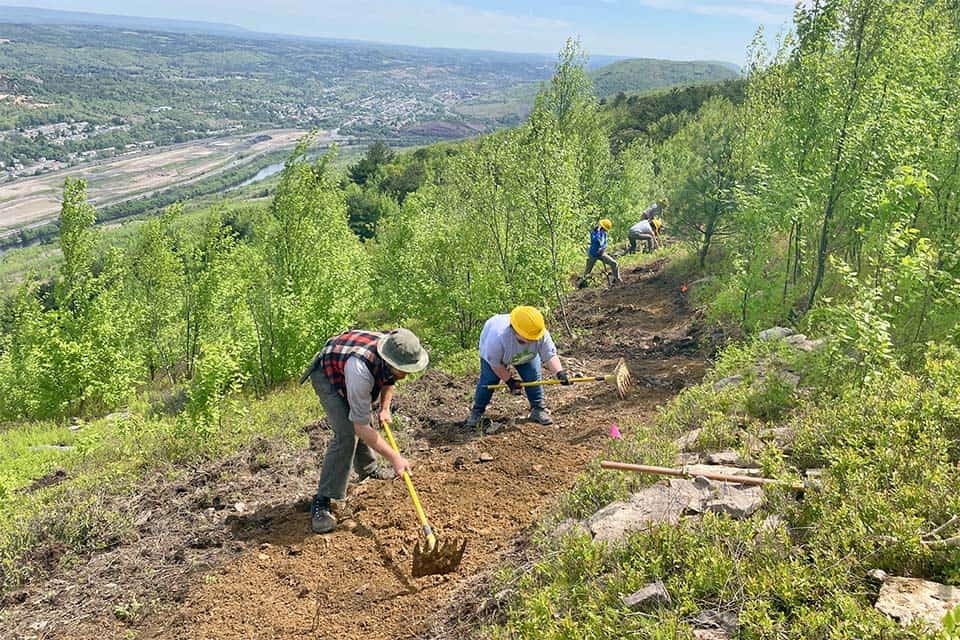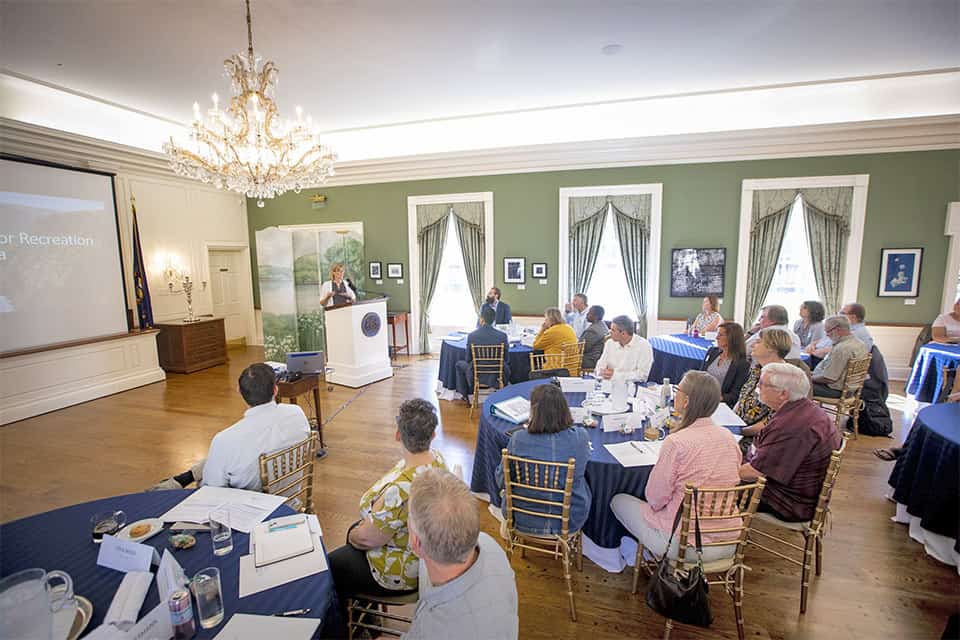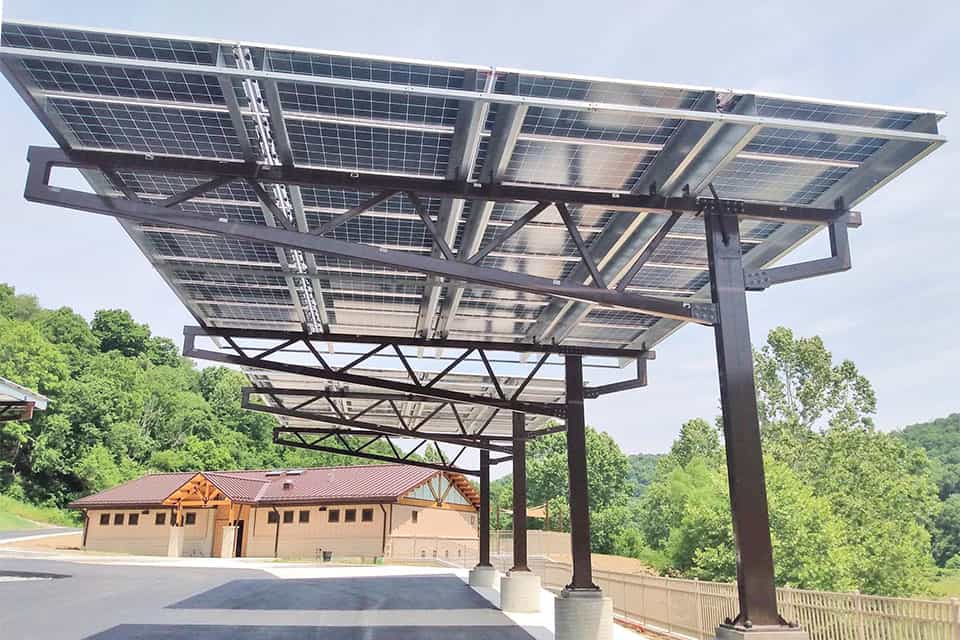Ensure the Future of Conservation
The major DCNR accomplishments of 2022 to ensure the future of conservation are listed below.
Pennsylvania Outdoor Corps
Created in 2016 with cooperation of the Department of Labor and Industry, the corps addresses a backlog of state park and forest improvement projects while instilling a sense of conservation and outdoors-oriented career options within young people. In 2022, the program mobilized 147 members to complete conservation, health and safety, and visitor-readiness projects in dozens of parks, forests and communities across the Pennsylvania.
A total of 23 crews worked last year from host locations across the commonwealth. From those crews, eight members were hired into DCNR in various positions within the agency.
In 2022, crews completed:
- 99 structure repairs;
- 78 miles of trail creation or repair;
- Planting 1,229 trees and native plants;
- Collection of 4,425 artifacts, cultural resources and other important data.
The Cultural Resource Crew operated in its second year and assisted the department’s new Cultural Resources Program. The crew completed excavations at 25 different projects, saving taxpayers approximately $500,000 with its work. The two additional specialty crews that were implemented in 2021, a roving trail crew, and an American Sign Language crew, continued work in 2022.

The Pennsylvania Outdoor Corps nine-month roving trail crew completed a two-mile reroute of the Appalachian Trail near Palmerton
Diversity, Equity, and Inclusion Initiatives
In Spring 2022, DCNR recruited and began work with its first group of 20 Next Gen Council members. The Next Gen Council was created to help increase public participation and diversity at state parks and forests by gathering input from a diverse group of engaged individuals.
The first cohort brings perspectives of members who range from middle school to mid-career, with a wide array of outdoor interests. In 2022, the Next Gen Council began developing projects related to enhancing sustainability efforts at DCNR State Parks and began looking at issues related to equity and access. They are working with staff to understand DCNR’s current initiatives and programs and to develop and integrate new ideas.
Over the summer and fall, DCNR Diversity, Equity, and Inclusion Committee members have been working together to create a vision for increasing access and inclusiveness both internally and with residents and visitors.
Another interesting initiative is the development of DCNR’s “Untold Stories” project, an effort partially funded by a National Park Service grant, to include stories about women, people of color, Native American tribes, and others whose previously untold stories will enhance visitor experience and understanding at state parks and forests.
Office of Outdoor Recreation
After hiring Nathan Reigner as Pennsylvania’s First Director of Outdoor Recreation to help ensure equitable access, investments, conservation, collaboration, and business development to support outdoor recreation in Pennsylvania, DCNR continued to work toward development of an Office of Outdoor Recreation.
There were several notable steps, including creating a Recreation Engagement Coalition to grow outdoor recreation and holding a public webinar to discuss the hidden value in the state’s outdoor recreation industry.

The Recreation Engagement Coalition met in September 2022 to kick off discussions on growing Pennsylvania’s outdoor recreation sector
Climate Change Adaptation and Mitigation
DCNR developed guidance for landowners, developers, planners, and local officials who are considering building grid-scale solar installations. The new resource, Conservation Considerations for Siting, Planning, and Maintaining Grid-Scale Solar Systems in Pennsylvania (PDF) includes a number of key resources for informed planning and decision-making assistance for landowners, municipal officials, developers, investors, and planners.
The Pennsylvania Climate Leadership Academy, which is jointly managed by DCNR, the Pennsylvania Department of Environmental Protection, and the GreenGov Council, provided climate change training to 90 individuals in 2022.
The academy is in the process of expanding its scope by including more state agencies and other stakeholders and pursuing a third-party contract to expand the training and develop a strategic plan that will ensure its long-term survival.
Climate change outreach and communication to external groups continued to expand last year. State Parks held more than 400 environmental education programs focused completely, or in part, on climate change, reaching more than 13,000 people.
Four of those programs were teacher professional development trainings and more than 40 were school programs. Additionally, the Director of Applied Climate Science spoke to 25 organizations and groups this year, ranging from universities and civic groups to state and national conferences, reaching 5,000 people.
In 2022, Pennsylvania’s Inter-Agency carbon capture, utilization and storage work group worked with the TeamPA Foundation to engage external stakeholders considering commercial deployment of carbon capture, utilization and storage and hydrogen energy projects in the Mid-Atlantic region.
The stakeholder group, known as the Pennsylvania Energy Horizons Cross-Sector Collaborative, recently submitted a concept paper to the U.S. Department of Energy for federal funding to support a regional clean hydrogen hub project in the Appalachian region.
DCNR’s Bureau of Forestry is assessing the quality and condition of Pennsylvania’s oldest forests and prioritizing potential old growth stands for ecological management as needed. Improving the health of these forests on state forest land will increase carbon storage and help mitigate the effects of climate change. Other work by the bureau includes:
- Developed and implemented a long-term monitoring protocol to track individual tree species’ ability to cope with climate change in supplemental plantings.
- Coordinated funding for equipment to help districts more than double seed collection of pitch pinecones, a species projected to cope relatively well with future climate change conditions in Pennsylvania.
- Integrated climate change connectivity spatial analysis into the bureau’s land acquisition ranking tool and spongy moth spray program prioritization process.
- Developed a Carbon Forest Principles outreach document and posted regional fact sheets on the DCNR website to assist the public in the management of climate change resilient forests.
DCNR plans to produce or purchase 100 percent of its electricity from renewable sources by 2030. DCNR expects to use 28.7 gigawatt hours of electricity by 2030 with a plan to have the department produce 15.5 gigawatt hours and purchase 13.2 gigawatt hours -- all from renewable energy sources.

New parking lot solar arrays at Ryerson Station State Park provide all the electricity needed at the park
Outdoor Programming Services/Youth Engagement
More than 270,000 people participated in state park educational programs, including nearly 52,000 who learned outdoor recreational skills such as archery, kayaking, snowshoeing, and geocaching.
State parks offered 72 teacher workshops on songbirds, watersheds, hiking, connecting preschoolers to nature, Project Learning Tree, Project Wild, Project WET, stand-up paddle-boarding, and climate change and provided 1227 programs for 58,873 school students.
Pennsylvania Council for the Arts: Arts in Education Program
Bald Eagle State Park, Jacobsburg Environmental Education Center, and Presque Isle State Park participated in a pilot project between state and the Pennsylvania Council for the Arts’ Arts in Education Program.
Nearly 950 students participated in field learning experiences at the parks or in-school and used their experiences to inspire the creation of an art piece.
Bay Watershed Education and Training (B-WET)
Overseen by the National Oceanic and Atmospheric Administration, program funding permits state parks to partner with other agencies to oversee implementation of activities to include learning experiences both outdoors and in the classroom to increase understanding and stewardship of watersheds and related ocean, coastal, riverine, estuarine, and Great Lakes ecosystems.
DCNR continued this partnership in 2022 and plans to continue in 2023.
Project Learning Tree
Forestry continued its steady leadership in youth forestry education through administering Project Learning Tree, the Scout Forest Conservation Award program, and the forestry component of Envirothon during 2022.